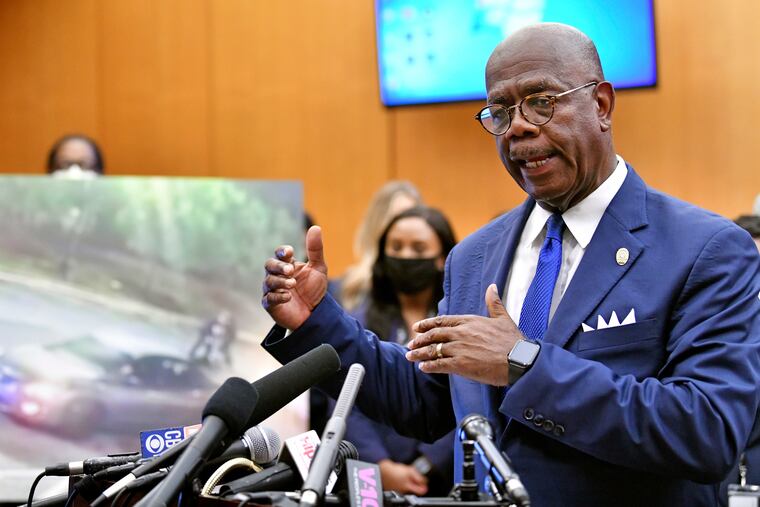Atlanta police call out sick to protest murder charge against officer who shot Rayshard Brooks
It's unclear how many officers declined to show up for their Wednesday night shift. The police department did not answer specific questions about the no-shows.

Hours after the Fulton County district attorney announced felony murder and other charges against the former Atlanta police officer who fatally shot Rayshard Brooks, a 27-year-old black man, in the back, a number of Atlanta police officers called in sick just before a shift change Wednesday evening.
The city was left scrambling to cover absences as the Atlanta Police Department tried to tamp down rumors of a mass police walkout that spread widely on social media.
It's unclear how many officers declined to show up for their Wednesday night shift. The police department declined to answer specific questions about the no-shows and the mayor did not release specific numbers when she spoke to reporters late Wednesday.
"We do have enough officers to cover us through the night," Mayor Keisha Lance Bottoms (D) told CNN. "Our streets won't be any less safe because of the number of officers who called out."
The Atlanta Police Department confirmed a larger-than-normal number of absent officers on Wednesday evening, but denied any mass strike in response to the criminal charges leveled against the two men involved in the fatal shooting of Brooks, whose death has sparked more protests against racism and police brutality.
Bottoms added that the city could rely on support from other law enforcement agencies in the area.
"We have other partners across the metropolitan area, including assistance from the state and from the county and from other jurisdictions," she said. "So, we will be fine."
Atlanta had already been rocked for weeks by Black Lives Matter protests and grief over the allegedly racially motivated slaying of Ahmaud Arbery in Glynn County, Ga. Tensions with the police flared again on Friday, when two officers responded to a call claiming Brooks had fallen asleep at the wheel while parked in a Wendy's drive-through.
Brooks initially cooperated with a field sobriety test, but a scuffle broke out when two officers attempted to arrest him. Brooks grabbed one officer's Taser and began running away. Prosecutors allege former officer Garrett Rolfe then shot Brooks in the back, said "I got him," and then kicked Brooks as he lay on the asphalt. His partner, Officer Devin Brosnan, stood on Brooks's arm after the shooting, prosecutors said.
Fulton County District Attorney Paul L. Howard Jr., announced murder and other charges against Rolfe on Wednesday. Brosnan faces aggravated assault and other charges.
Hours after the charges were announced, some Atlanta police officers began calling out just before their night shifts started. A police union spokesman confirmed the protest to NBC News, but said the union had not organized a formal walkout. Throughout Wednesday night, more officers reportedly called in sick, refused to show up to any calls except those requesting backup and went radio-silent.
"This is not an organized thing, it's not a blue flu, it's not a strike, it's nothing like that," Vince Champion, a spokesman for the International Brotherhood of Police Officers, told NBC News. "What it actually is is officers protesting that they've had enough and they don't want to deal with it any longer."
The "blue flu," which Champion denied, is a type of de facto police strike in which a large group of officers simultaneously call out sick. Essential state employees, like police and first responders, are legally forbidden from actually walking out on the job in many jurisdictions.
Champion added that many officers felt prosecutors had not publicly shared sufficient evidence to back up the charges leveled against Rolfe, in part because the district attorney only released a video still that appears to show the former officer kick Brooks rather than the full video itself.
As officers began canceling their shifts Wednesday night, President Donald Trump joined the fray to criticize the district attorney's decision. In an interview with Fox News on Wednesday night, Trump called the shooting "a very, very sad thing," but then suggested Brooks was at fault.
"I thought it was a terrible situation, but you can't resist a police officer," he said on Sean Hannity's show. The president repeated a claim made by Rolfe's defense attorney, saying that the officer believed he had seen a flash and heard a gunshot before firing on Brooks.
"I hope he gets a fair shake because police have not been treated fairly in our country," Trump said. "But again, you can't resist a police officer like that. And they ended up in a very terrible disagreement and look at the way it ended. Very bad. Very bad."
The wheels of justice have moved strikingly fast in Atlanta over the last week. Just two days after Brooks's death, video of the fatal encounter was released to the public and Atlanta's mayor had already called for Rolfe to be fired. By the end of Sunday, Rolfe had been fired, Brosnan had been placed on administrative duty, and former police chief Erika Shields had resigned.
Less than a week after the incident, Rolfe and Brosnan were criminally charged.
The rapid pace comes as ongoing Black Lives Matter protests demand police reforms in the wake of George Floyd's death, after a Minneapolis police officer pressed his knee into Floyd's neck for more than eight minutes. Although the quick action in Atlanta has been praised by civil rights advocates and hailed as a victory for activists, some in the police department have decried the quick process.
Bottoms said that morale in Atlanta's police department was at a low, perhaps even more so than in other jurisdictions facing intense scrutiny and criticism during the last three weeks of protests.
“The thing that I’m most concerned about is how we repair the morale in our police department,” Bottoms said on CNN, “and how do we ensure our communities are safe as they interact with our police officers.”